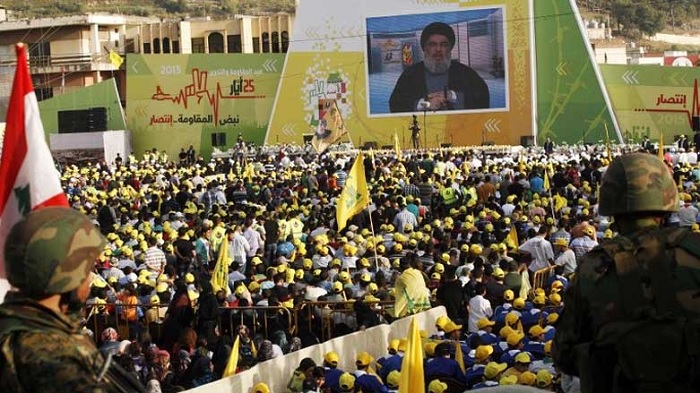
The US has announced sanctions on a large number of Iranians who have been involved in cyber attacks, carried out by Iran’s Ministry of Intelligence and Security (MOIS.) It also sanctioned two Lebanese companies and a Lebanese businessman linked to Hizbollah.
The sanctions, announced on Thursday, fit into an increasingly tougher US policy toward all dimensions of Iranian activities in the region, including groups that Tehran supports, such as Hizbollah, which the US has long designated as a terrorist organization.
Sanctions against Iranian Intelligence
“Iran is one of the world’s leading threats to cybersecurity and human rights online,” Secretary of State Mike Pompeo said in a statement issued on Thursday.
Washington sanctioned what Pompeo described as “the Iranian cyber threat group, Advanced Persistent Threat 39 (APT 39),” along with 45 MOIS employees and an Iranian front company: Rana Intelligence Computing Company.
Pompeo explained that Tehran had targeted “at least 15 countries in the Middle East and North Africa, as well as hundreds of individuals and entities in 30 additional countries across Africa, Asia, Europe, and North America.”
Last month, the Office of the Director of National Intelligence (ODNI) issued a statement explaining that Russia, China, and Iran were all attempting to influence November’s presidential elections.
“We assess that Iran seeks to undermine US democratic institutions, President Trump, and to divide the country in advance of the 2020 elections,” the ODNI said. However, Iranian election meddling was not mentioned in Thursday’s actions.
Rather, as the Treasury Department explained in its statement on Thursday, the MOIS sanctions arose “as the result of a long-term investigation conducted by the FBI (Federal Bureau of Investigation) Boston Division.”
“The MOIS, camouflaged as Rana, has played a key role in the [Government of Iran’s] abuse and surveillance of its own citizens,” the Treasury Department stated.
“Through Rana, on behalf of the MOIS, the cyber actors designated today used malicious cyber intrusion tools to target and monitor Iranian citizens, particularly dissidents, Iranian journalists, former government employees, environmentalists, refugees, university students and faculty, and employees at international nongovernmental organizations,” it continued.
In the US, Rana’s focus was “primarily” companies involved in travel services. At least 15 such companies were targeted, the FBI said, noting that they “store the records of millions of travelers.”
Hizbollah Sanctions
The US also sanctioned two Lebanese companies: Arch Consulting and Meamar Construction “for being owned, controlled, or directed by Hizbollah,” the Treasury Department said.
A Lebanese businessman, Sultan Khalifah As’ad, described by Treasury as “a Hizbollah Executive Council official, who is closely associated with both companies” was also designated.
The companies were used to evade US sanctions and conceal the transfer of funds to Hizbollah, “enriching” its “leadership and supporters, and depriving the Lebanese people of much-needed funds,” it stated.
“Hizbollah conspires with Lebanese officials” to “direct government contracts worth millions of dollars to these companies, which are overseen by Hizbollah’s Executive Council,” Treasury explained.
Thursday’s Treasury Department statement cited two earlier steps that it had taken, one of which was the designation in February 2020 of Atlas Holding, another company under the purview of the Hizbollah Executive Council.
And earlier this month, Treasury sanctioned two Lebanese political figures who collaborated with Hizbollah, but were not, themselves, members of the organization.
Yusuf Finyanus was Lebanon’s Minister of Transportation and Public Works from 2016 to early 2020. He is a member of the Christian Marada Party, which is allied with Hizbollah.
Finyanus collaborated with the organization “to ensure that Hizbollah-owned companies won bids for Lebanese government contracts worth millions of dollars,” Treasury charged. In return, Finyanus received “hundreds of thousands of dollars” from Hizbollah.
Ali Hassan Khalil, a former finance minister, from Amal, a Shi’ite party, but less extreme than Hizbollah, was also sanctioned. Like Finyanus, he also used his official position to hide Hizbollah financial transactions.
Moreover, “Khalil, as Finance Minister refused to sign checks payable to government suppliers in an effort to solicit kickbacks,” Treasury charged. “He demanded that a percentage of the contracts be paid directly to him.”
The designation of the two Lebanese politicians is one element in a US effort to reshape Lebanese politics in the wake of the Aug. 4 explosion at the port of Beirut that killed over 200 people and left 300,000 homeless.
The sanctions were announced following a visit to Beirut by David Schenker, Assistant Secretary of State for Near Eastern Affairs. Quite unusually, Schenker met only with the Lebanese opposition and not with any members of its political establishment.
“Senior administration officials said the sanctions should serve as a warning to other Lebanese officials accused of corruption and tied to Hizbollah,” The Wall Street Journal reported. They are also intended “to sideline” Finyanus and Khalil “from being able to participate in any new government,” it said.
US policy toward Lebanon is being coordinated with France, the former colonial power. Since the Beirut port explosion, French President Emmanuel Macron has twice visited Lebanon, and he is promoting a far-reaching program of political reform in exchange for the international financial assistance that Lebanon badly needs.
However, a major obstacle has emerged: the unwillingness of corrupt parties to relinquish the positions, power, and privileges they have long enjoyed, despite the country’s pressing need for aid.
 Eurasia Press & News
Eurasia Press & News


